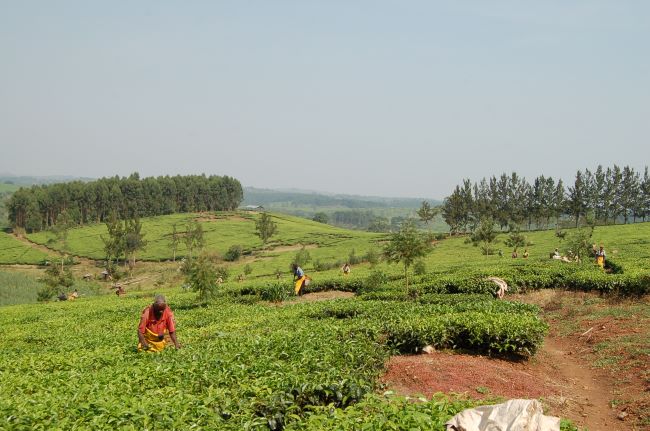KYENJOJO, November 25, 2024: Tea farmers in Uganda are urgently appealing to the government for a Shs 126 billion bailout to revive the struggling industry, which is on the brink of collapse due to low prices. The crisis has led many farmers in the country to abandon tea cultivation in favour of more profitable enterprises.
Last week, farmers, led by Onesmus Matsiko, Chairperson of the Uganda Tea Outgrowers Association [UTOA], presented their appeal to Parliament’s Trade Committee. They warned that without government support, many in the sector risk losing their property to commercial banks due to unpaid loans.
Matsiko explained that half of the Shs 126bln is needed to procure green leaf. The remaining funds would be used to stabilise the sector. He further cautioned that without government intervention, many tea factories may be forced to close due to mounting debts.
“We request Parliament to direct the Microfinance Support Centre [MSC] to allocate Shs 31.5 billion to finance tea out-growers. This will reduce farmers’ reliance on processing factories to finance primary production and help them remain productive by continuing to supply green leaf while awaiting revenue from the tea cycle,” said Matsiko.
Gomba district Woman Member of Parliament, Sylvia NayebareSylivia Nayebare who doubles as Chairperson of the Trade Committee, questioned whether the tea industry in Uganda was functioning properly without government intervention but assured farmers that Parliament takes their concerns seriously.
Tea farmers across Uganda are facing a looming crisis, with several processing factories on the verge of closure, which could leave many workers jobless. The anticipated factory closures are attributed to low tea prices, prompting some farmers to uproot their tea gardens in favor of more lucrative crops, such as coffee.
UTOA is also calling for the swift implementation of a national tea policy to establish regulatory standards and improve the quality of Uganda’s tea. “Regulation and green leaf standards are urgent. In the mid- to long-term, we need a comprehensive tea policy that will guide which varieties should be grown,” Matsiko emphasised.
He pointed out that Ugandan tea is sold for less than US$1 per kilogramme internationally, while Kenya and Rwanda’s teas earn over US$2 and US$3, respectively, due to better quality and stronger regulation.
Farmers have also proposed that the Uganda National Bureau of Standards [UNBS] develop and enforce quality standards for green leaf. This would require processing factories to purchase only high-quality tea, potentially increasing the market value of Uganda’s tea.
In addition, tea farmers are requesting government fertilizer subsidies, which they propose should be 75 percent for the first season, 50 percent for the second season, and 25 percent for the third season. The total estimated cost of this initiative is Shs 41bln.
Matsiko also expressed concern over the need for government support to help recover abandoned tea gardens. “Many tea factories are facing the threat of bank loans, with some on the brink of closure. Factory companies were promised government assistance in restructuring their loans, but it seems this has not happened,” he said.
In the Tooro Sub-region, many tea out-growers have abandoned their gardens since the start of the year, when the price of green tea leaves dropped to between Shs 100 and Shs 150 at the farm gate.
The declining quality of Uganda-processed tea has contributed to the country’s inability to sell its tea above a dollar at recent auctions. However, during the Mombasa Tea Auction, which closed on September 17, Ugandan tea prices saw a notable increase, with the average price rising from US$ 0.87 per kilogram in August to US$ 0.98. In the September 23 auction, the price further increased to US$ 1.01 per kilogram.
About tea in Uganda
Tea is Uganda’s third most important agricultural export after coffee and fish. It is a key commodity in the government’s strategic intervention program for National Development, focusing on production, processing, marketing, and export in the agricultural sector.
Tea is one of the 12 priority commodities in Uganda’s Vision 2040 and plays a significant role in the Third National Development Plan [NDPIII] under agro-industrialisation.
More than 68 percent of Uganda’s tea acreage is owned by tea out-growers. The country has 32 tea processing factories, five of which are owned by shareholder farmers.
According to Dr. Samuel Mugasi, Executive Director of the National Agricultural Advisory Services [NAADS], Uganda currently produces over 80,000 metric tonnes of tea annually, which exceeds the processing capacity of the country’s 32 tea factories. Since 2013, the government, through NAADS, has distributed over 500 million tea seedlings, leading to increased production of green leaf.
Mugasi stressed the need for increased investment in national tea processing capacity, particularly for the 19 factories still under development.
Tea is Uganda’s fourth-largest agricultural export, following coffee, maize, and fish. Over the last five years, tea has accounted for an average of 3.6% of Uganda’s export earnings and is recognized for its potential to significantly contribute to national income, employment, and environmental conservation.
Tea has earned Uganda an average of US$ 76 million annually over the past eight years, peaking at US$93.879mln in 2018.
The tea sector employs around 80,000 farming households and supports 150,000 skilled and unskilled workers, with approximately 1mln people relying on tea cultivation for their livelihoods.
Traditional tea-growing districts include Mukono, Buikwe, Mubende, Mityana, and Masaka in the central region, Kyenjojo, Kibale, Hoima, and Kabarole in the western region, and Bushenyi, Buhweju, Kanungu, and Kabale in the southwestern region. Recently, tea growing has expanded into new districts such as Kabale, Kisoro, Rubanda, Rukungiri, Sheema, Nebbi, Zombo, Isingiro, Ntungamo, Mitooma, Rubirizi, Kamwenge, and Mbarara.
Tooro Sub-region is the leading producer, contributing 39 percent of total production, followed by Ankole at 29 percent, Kigezi at 12 percent, Buganda at 12 percent, and Bunyoro at 9 percent.
https://thecooperator.news/lack-of-tea-policy-affecting-ugandas-farmers/
Buy your copy of theCooperator magazine from one of our countrywide vending points or an e-copy on emag.thecooperator.news
